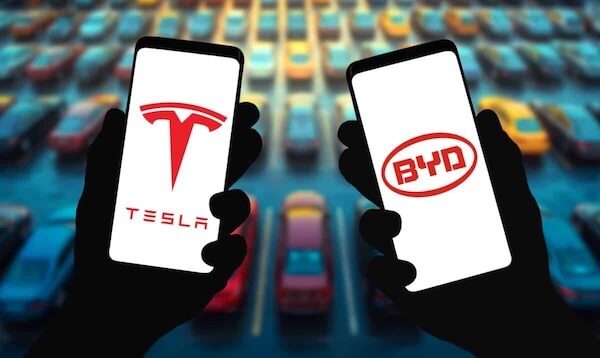BYD's relentless pursuit of battery innovation is rapidly emerging as a significant challenge to Tesla's long-held dominance in the electric vehicle (EV) market. With breakthroughs in battery technology, particularly the Blade Battery and ultra-fast charging capabilities, BYD is not only redefining EV safety standards but also democratizing access to cutting-edge technology through cost-effective solutions. This article explores BYD's battery innovations and their potential impact on Tesla's market position.
The Blade Battery: A Revolution in Safety and Efficiency
BYD's Blade Battery, officially launched in 2020, represents a major advancement in lithium iron phosphate (LFP) battery technology. Unlike traditional lithium-ion batteries that use nickel-cobalt-manganese (NCM) chemistry, the Blade Battery utilizes LFP, offering enhanced safety, longer lifespan, and reduced cost. The "blade-like" design significantly increases space utilization within the battery pack by over 50% compared to conventional LFP batteries. This design optimizes energy density, allowing for longer driving ranges without increasing battery size or weight.
One of the most remarkable features of the Blade Battery is its exceptional safety performance. It has passed the rigorous nail penetration test without emitting smoke or fire, demonstrating its superior thermal stability. BYD claims that EVs equipped with the Blade Battery are far less susceptible to catching fire, even when severely damaged. In addition to safety, the Blade Battery offers a long battery life with over 5,000 charge and discharge cycles, translating to a lifespan of up to 1.2 million kilometers. Its cell-to-pack (CTP) technology enhances structural integrity, efficiency, and overall vehicle safety.
Ultra-Fast Charging: A Game-Changer for EV Adoption
BYD has recently unveiled an ultra-fast charging system that represents a significant leap in EV performance. This system boasts a 1,000V electrical architecture and 10C charging rate batteries, enabling EVs to gain up to 400 km (249 miles) of range in just 5 minutes. This groundbreaking technology addresses one of the primary concerns of EV owners: long charging times.
To support this ultra-fast charging capability, BYD plans to build over 4,000 megawatt "flash-charging stations" across China. These stations will allow drivers to take full advantage of the five-minute charging capability, making EV ownership more convenient and appealing. The first models to feature this technology will be the Han L sedan and the Tang L SUV, setting a new industry benchmark for charging speed and convenience.
BYD vs. Tesla: A Clash of Philosophies
While Tesla has traditionally focused on high-performance, long-range EVs with premium pricing, BYD is taking a different approach by prioritizing cost efficiency, safety, and scalability. Tesla's 4680 battery, which uses NCM chemistry, achieves higher energy density but requires more complex cooling systems due to increased heat generation. In contrast, BYD's Blade Battery, with its LFP chemistry and prismatic format, offers better heat dissipation and reduces the need for advanced cooling solutions.
A recent study analyzing the internal structures of Tesla's 4680 battery and BYD's Blade Battery revealed key differences in design priorities. Tesla's batteries are engineered for high energy density and performance, while BYD's focus on space efficiency and the use of more cost-effective materials. Notably, the study found that BYD's battery design offers greater overall efficiency due to improved thermal management.
Market Impact and Future Outlook
BYD's battery innovations are already having a significant impact on the EV market. The company has surpassed Tesla in global EV sales for two consecutive quarters, driven by its aggressive expansion strategy, technological leadership, and vertically integrated production model. Counterpoint Research projects that BYD will overtake Tesla as the global BEV leader in 2025, capturing a 15.7% market share.
BYD's strategy of offering high-performance EVs at more affordable prices is gaining traction among consumers who value efficiency and reliability. The company's focus on battery safety and ultra-fast charging is also addressing key consumer concerns and boosting EV adoption. As BYD continues to innovate and expand its presence worldwide, it is poised to become a major force in the global EV market, posing a significant challenge to Tesla's dominance.
However, Tesla is not standing still. The company is actively developing new battery technologies, including solid-state batteries and silicon anode batteries, to improve energy density, safety, and charging times. Tesla is also working to increase the silicon content in its battery anodes, aiming to boost energy density further. The competition between Tesla and BYD is driving innovation in the EV battery industry, ultimately benefiting consumers and accelerating the transition to sustainable transportation.

















